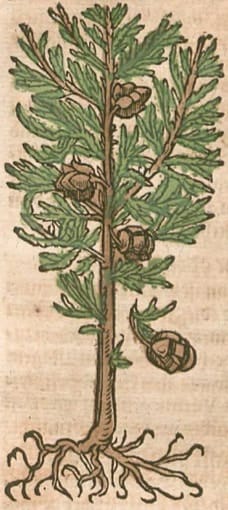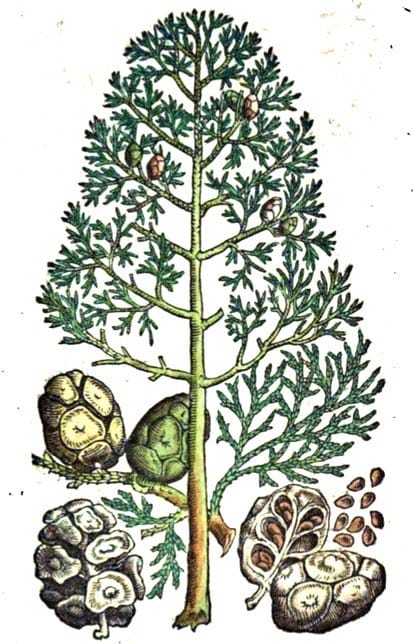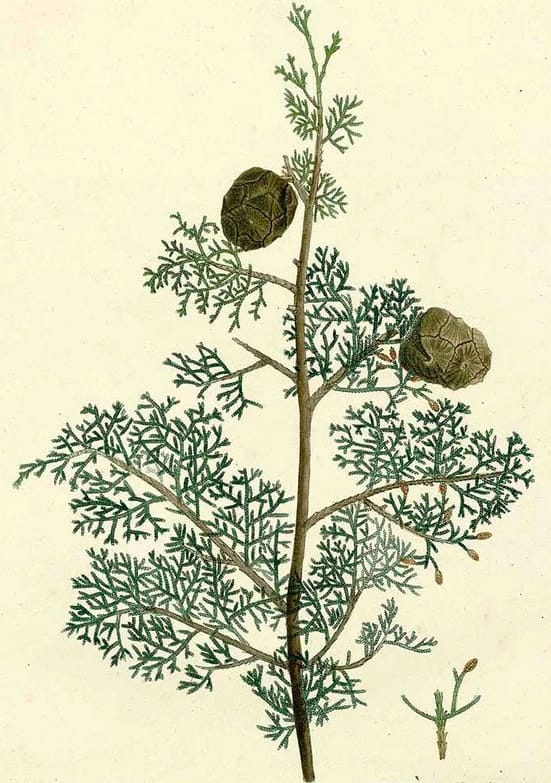Cypressus, Cypress treeSarw (Unani) |

|
 Krauterbuch, Lonitzer, 1578
Krauterbuch, Lonitzer, 1578 Kreutterbuch, Matthiolus, 1586
Kreutterbuch, Matthiolus, 1586 Duhamel du Monceau, Traité des arbres et arbustes, Nouvelle édition, 1806
Duhamel du Monceau, Traité des arbres et arbustes, Nouvelle édition, 1806Botanical name:
Cupressus sempervirens
Parts used:
‘Cypress Nuts’ (Fruit); Cypress Turpentine; Wood; rarely the leaves
‘Its nuts are comparatively stronger than all parts of its leaves’ (Avicenna)
Temperature & Taste:
Warm, dry. Pungent, Bitter
“Hot in the First and Dry in the Second degree”. (Avicenna)
Dioscorides said it ‘Binds and Cools’
Classifications:
2B ATTENUATERS 2L. EMOLLIENT 2N. REPELLENTS 2O. ASTRINGENTS 2Z. CICATRIZING
4e. STOMACHIC
ROOT:
4g. HEPATIC
Uses:
Cypress Nuts:
1. Astringes to Stop Leakage:
-Diarrhea, Dysentery
-Incontinence, Frequent Urination
-Hernia
2. Moves the Blood, Clears Stasis:
-Varicose Veins, Hemorrhoids, Cramps
3. Stops Bleeding:
-Bleeding (Dioscorides)
-Hemoptysis (Pliny, Avicenna)
4. Clears Wind and Damp, Promotes Urine:
-Dysuria, Edema, Gravel, Stones
5. Stops Cough:
-“Dyspnoea, Orthopnoea and Chronic Cough” (Avicenna)
6. Externally:
-Varicose Veins, Hemorrhoids (topically in baths, ointments, suppositories)
-used to agglutinate Wounds and stop bleeding (since Dioscorides)
-applied to moist Gangrenes.
-topically for Leg Cramps
-Erysipelas, Shingles, Herpes (Dioscorides, Avicenna)
-Hardness, indurations (Dioscorides)
-Nose Polyps (Dioscorides, Avicenna)
-Hernia and other Ruptures. (Avicenna)
-“Its decoction with vinegar alleviates Toothache”. (Avicenna)
-fruit and leaves burned repel Mosquitoes (Dioscorides)
-leaves, beaten with Vinegar, dye the hair (Dioscorides)
ROOT:
Cool, dries and astringent.
1. Moves the Blood, Promotes Menstruation:
-Amenorrhea
2. Clears Damp, Promotes Urine:
-Strangury
3. Resists Poison:
-Spider and Scorpion Bite
Dose:
Fluid Extract (1:1): 25–50 drops
Tincture (1:5): 50–100 drops
Extract: 300–500mg, 2-3 times daily
Decoction as a Wash externally: 20–30 grams per liter.
Ointments: 2–5% for Hemorrhoids and Varicose veins
Substitutes:
1. ‘The pomegranate peel in its half quantity and red sarcocolla weighing equal to it act as substitutes for cypress’. (Avicenna)
2. Cypress Nut: Cardamon, Acorn cap
3. Cypress Bark: Pomegranate bark
4. Cypress leaf: Juniper leaf, Savin
Main Combinations:
1. Strengthen the Stomach, Cypress nuts with Aloeswood, Cinnamon, Rose, Mastic (as in Electuary to Strengthen the Internal Members)
2. Restorative in marked deficiency, Cypress nuts with Cinnamon, Clove, Galangal, Aloeswood, Nutmeg, Tabasheer, Rose, Violet, Licorice, Mastic (as in Restorative of Nicholas (Pleres Arconticon))
3. Incontinence:
i. and difficult urination, Cypress with Grape Syrup and a little Myrrh (Dioscorides)
i. Cypress nuts with Comfrey, Cyperus rotundus, Galangal, Plantain, Horsetail, Cinquefoil
4. Gonorrhea, Spermatorrhea, Cypress nuts with Tabasheer, Poppy seed, Aniseed, Frankincense
5. Threatened Miscarriage, Cypress nuts with Red Coral, Mastic, Mint, Chestnut, Myrtle seed
6. Infertility from Cold, Cypress nuts with Cinnamon, Long Pepper, Turnip seed, Nettle seed, Seseli, Indian Spikenard, Cardamon, Nutmeg (as in Warming Confection for Infertility (Wirtzung))
7. Hardness, Cypress nuts cuts finely with Fig and applied (Dioscorides)
8. Scaly nails, boil Cypress nuts with Vinegar and triturated with Lupins, applied. (Dioscorides)
9. Erysipelas, Shingles, Cypress leaves applied with Barley (Dioscorides)
10. Hernia, drink wine with a decoction of Cypress nuts added (The Secrets of Alexis, 1615)
Major Formulas
Wine for Incontinence
Powder for Hernia of Vigo
Powder of Digher (Unani)
Troches of Earth of Lemnos (Trochisci de Terra Lemna)
Restorative of Nicholas (Pleres Arconticon) (Nicholas)
Electuary for Incontinence (Riverius)
Electuary to Strengthen the Internal Members (Azaricon)
Warming Confection for Infertility (Wirtzung)
Pills to Prevent Miscarriage (Wirtzung)
Cautions:
1. Avoid in Pregnancy and lactation. Teratogenic effects have been noted.
Main Preparations used:
-
Extra Info
-
History
|
‘The leaves of the cypress are pounded and applied to wounds inflicted by serpents, and with polenta, to the head, in cases of sunstroke. They are used also for hernia, and an infusion of them is taken in drink. They are applied with wax to swellings of the testes, and mixed with vinegar they stain the hair black. Beaten up with twice the quantity of light bread, and then kneaded with Aminean wine, they are found very soothing for pains in the feet and sinews. The excrescences of this tree are taken in drink for the stings of serpents and for discharges of blood from the mouth; they are used also as a topical application for gatherings. Fresh-gathered and beaten up with axle-grease and bean-meal, they are good for hernia; and an infusion of them is taken in drink for the same complaint. In combination with meal, they are applied |
topically to imposthumes of the parotid glands, and to scrofulous sores. From these excrescences, pounded along with the seed, a juice is extracted, which, mixed with oil, disperses films of the eyes. Taken in doses of one victoriatus, in wine, and applied at the same time in a pulpy, dried fig, the seeds of which have been removed, this juice cures maladies of the testes and disperses tumours: mixed with leaven, it heals scrofulous sores. The root of the cypress, bruised with the leaves and taken in drink, is curative of diseases of the bladder, strangury, and the sting of the phalangium. The shavings of the wood, taken in drink, act as an emmenagogue, and neutralize the venom of the scorpion.’ (The Natural History of Pliny, trans. by Bostock and Riley, Vol. 5, 1856) |
